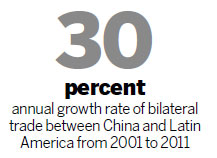
China should seek deeper trade and investment cooperation with Latin America amid the global economic slowdown and sluggish international demand, senior officials said on Wednesday.
China, as the biggest emerging market, "shares increasing complementarities with Latin American nations, the world's most dynamic economies. Deepening bilateral trade diversifies China's exports and also helps the global economic recovery," Abdulahat Abdurixit, vice-chairman of the 10th National Committee of the Chinese People's Political Consultative Conference, said in a keynote speech in the 6th China-LAC Business Summit, which is being held in Hangzhou, capital of Zhejiang province, from Wednesday to Thursday.
Bilateral trade increased about 30 percent annually since 2001 to reach $241.5 billion in 2011, while Chinese investment in Latin America totaled $10.1 billion in 2011, 16.8 percent of China's outbound investment last year.
China has become Latin America's third-largest trade partner, and the region's third-largest investment source, said Li Chao, deputy head of the State Administration of Foreign Exchange.
However, the lackluster global economic situation is taking a toll on bilateral trade.
"The sluggish world economic recovery and the festering European debt crisis reduced international demand and drove down trade between China and Latin America," said Wan Jifei, chairman of the China Council for the Promotion of International Trade, or CCPIT.
China's trade with Brazil - the largest Latin American economy - rose 5 percent from a year earlier in the first nine months of the year, lower than China's total trade growth in the same period, which was 6.2 percent year-on-year, but much higher than the 2.7-percent decline in trade between China and the European Union, the country's biggest trade partner, according to the General Administration of Customs.
Yu Ping, CCPIT's deputy head, said that natural resources accounted for a large share of China's imports from Latin America and that the unbalanced trade structure should be adjusted.
"We must enter a new chapter of trade with China" and improve the trade structure, while opening up bilateral trade in services, said Fernando Ocampo, Costa Rica's vice-minister of foreign trade.
Luis Alberto Moreno, the president of the Inter-American Development Bank, said that China and the Latin American and Caribbean regions will strengthen mutual dependence, while urging direct investment in each other's economies to overcome trade imbalances, a deficit of $96 billion in 2010 in favor of China.
"The first wave of Chinese direct investment in Latin America mostly went to mining, metals and energy resources. Many Chinese companies are also looking for investments in manufacturing and agriculture," Moreno said.
He added that mutual investments are "too small in view of the total trade volume. Tariff and non-tariff barriers need to be lifted".
The bank, the largest source of development financing for Latin America and the Caribbean, signed a memorandum of understanding with the People's Bank of China on Tuesday to boost regional development.
"Chinese companies should seize the chance to invest in Latin America's industrial restructuring," Abdurixit said.
China has also been restructuring its economic growth model and placing greater emphasis on domestic demand, which will boost Latin American exports, according to Abdurixit.
"China will have imports worth $10 trillion in five years. We hope that Latin America deeply studies the Chinese market and its consumer habits, and increases its high-added value exports," Abdurixit said.
Urbanization, a key characteristic of China's restructuring of its economic growth model, is also an important area for the two sides to cooperate in energy saving, urban planning and the use of renewable energy.
"China's urbanization process is the largest migration of humans in the world. As the middle class grows, as the wave goes on, China will continue to secure natural resources," said Erik Bethel, managing partner of SinoLatin Capital, a Shanghai-based merchant bank.
Contact the writers at lijiabao@chinadaily.com.cn and zhangjianming@chinadaily.com.cn
